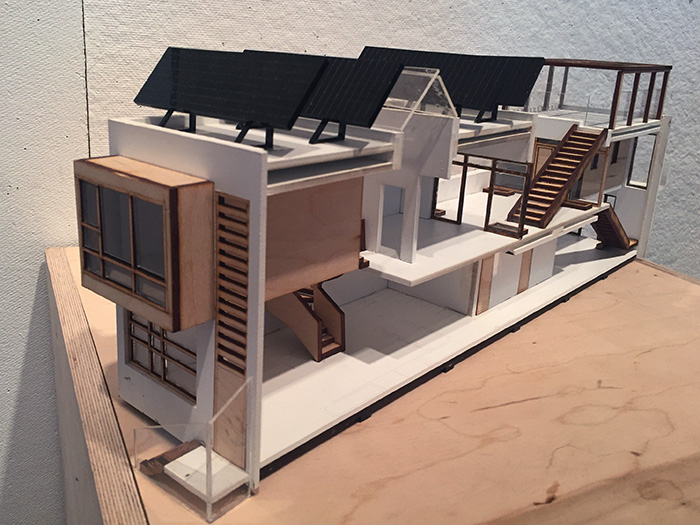Students and faculty from McGill and Concordia have teamed up to construct a sustainable dwelling to enter the 2017 Solar Decathlon China. This year the competition will be held in Dezhou, China’s ‘Solar Valley’–so named because of the region’s focus on solar power generation. The design theme of this year’s competition is the construction of a two-story solar-powered house for a single family in Dezhou.
Team Montreal is comprised of students and faculty from several different departments at Concordia and McGill. The diverse group of faculty support have experience in team management, research, and sustainable building practices.
An international extension to a U.S. Department of Energy program which has been held biennially since 2002, the Solar Decathlon China was started in 2011, in partnership with China’s National Energy Administration, as a contest where university teams from four different continents compete to construct the greenest dwelling. These contestants must design a functional, comfortable, and sustainable home by connecting clean energy technology, energy conservation, and environmental stewardship with creative architectural design. Their successful designs have been used to model the future of sustainable living and to stimulate future development and ecological awareness. The Solar Decathlon China requires that the residence be equipped with the necessary appliances for occupancy by a real family. The designs are evaluated by a panel of experts on the bases of cost, efficiency, power capacity, and architectural quality.
Team Montreal developed a Deep-Performance Dwelling (DPD) design that is applicable to both the living context in Dezhou and in Montreal. The team plans to construct a permanent home in both cities. The DPD is meant for an urban setting and is inspired by iconic designs like the Montreal Rowhouse and the Siheyuan Courtyard house, taking a culturally integrative approach.
“‘Deep-Performance’ implies a socially, culturally, and technologically advanced architecture that embodies qualitative and quantitative notions of performance in addressing energy efficiency, comfort, well-being, affordability, environmental sustainability, and ecological awareness,” Team Montreal writes on its website.
Through typological architecture, the dwelling is innovatively designed as a net-zero energy and low-to-zero carbon system housing unit.
“Our approach to net-zero energy is through Passive House design and construction principles,” Ben Wareing, architecture lead for the team, said. ”This methodology allows us to reduce the energy demand by 70 to 80 per cent, [while] the remaining demand met by the [solar] photovoltaic system on the roof.”
The house design promotes an interplay between technological advancement and sustainable living. For example, inhabitants are made aware of solar power usage, among other data, from
sensors within the house, encouraging an ecologically-minded lifestyle through visualization. The core of the DPD design is flexibility and adaptability through time.
Team Montreal’s innovative design draws from multiple disciplines to encourage learning and research in a variety of fields.
“It’s a great pedagogical opportunity for our students because the project itself is based on innovation and collaboration,” Carmela Cucuzella, associate professor from the Department of Design and Computation Art at Concordia and one of the main faculty members involved, explained. “It’s hard to get such an opportunity at an undergraduate level, so we are very excited.”
The team is supported by distinguished research labs, such as the Facility for Architectural Research in Media and Mediation (FARMM) at McGill, the Centre for Zero-Energy Building Studies (CZEBS) at Concordia, and the Topological Media Lab (TML) at Concordia.
“We would like to create awareness and prove that if students can provide affordable net-zero energy housing, then the industry should be able to apply these design principles and techniques [as well],” Wareing said. “We are trying to propagate an approach that encompasses socio-cultural, economic, and environmental aspects [… towards] a holistic approach to sustainability.”








